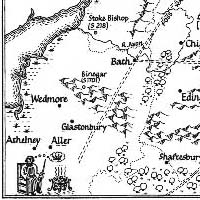March 23, 878: Alfred the Great makes a stronghold at Athelney
 Not even reputable historians are immune to the story of Alfred and the cakes, a folk-tale which arose in the twelfth century. The story goes that Alfred was at such low ebb that he had to travel in disguise, and was given space by a fire in a peasant woman's house provided that he watched over the cakes. And of course his mind wandered to his troubles and the cakes burnt and the woman gave him a severe scolding. It is hard to imagine this comic tale appearing when people were still close enough to remember the terrifying reality: on March 23 in 878, it looked as though the last English kingdom would fall to the Viking invaders.
Not even reputable historians are immune to the story of Alfred and the cakes, a folk-tale which arose in the twelfth century. The story goes that Alfred was at such low ebb that he had to travel in disguise, and was given space by a fire in a peasant woman's house provided that he watched over the cakes. And of course his mind wandered to his troubles and the cakes burnt and the woman gave him a severe scolding. It is hard to imagine this comic tale appearing when people were still close enough to remember the terrifying reality: on March 23 in 878, it looked as though the last English kingdom would fall to the Viking invaders.
Alfred, much later known as Alfred the Great, became king in 871, after three of his brothers had been king before him in the previous 13 years. In the first year of his reign he fought at least nine major battles with the Vikings, and was so hard pressed that he was forced to come to terms with them and pay them to leave. In the next few years the Vikings were largely occupied with sharing out other English kingdoms, but in January 878 they came back and occupied Wessex, and the people submitted to them, and Alfred was reduced to wandering through the woods and fens of the westernmost margins of what had been his kingdom.
Richard Abels notes that Athelney, the island in the marshes where Alfred made his stronghold, is only 365 paces long by 50 paces across -- so this was certainly Alfred's most desperate hour. The tide would be turned by the battle of Edington a couple of months later, and a peace with Guthrum, leader of the Viking army, a month after that -- and Alfred then had ten years of relative peace while the Vikings ravaged mostly on the Continent to shore up the English defences so that when the Vikings returned in 893 it was a very different story and they left, defeated, only three years later. Viking settlers still held most of the rest of the island, of course, and it would be the work of the first half of the tenth century for Alfred's heirs to defeat them.
Review the history, 856-899.